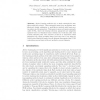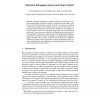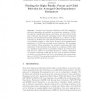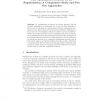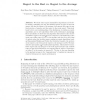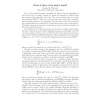124
click to vote
ECML
2007
Springer
15 years 8 months ago
2007
Springer
Abstract. Existing relational learning approaches usually work on complete relational data, but real-world data are often incomplete. This paper proposes the MGDA approach to learn...
86
Voted
ECML
2007
Springer
15 years 8 months ago
2007
Springer
We describe a novel framework for class noise mitigation that assigns a vector of class membership probabilities to each training instance, and uses the confidence on the current ...
110
click to vote
ECML
2007
Springer
15 years 8 months ago
2007
Springer
Abstract. Active Learning methods rely on static strategies for sampling unlabeled point(s). These strategies range from uncertainty sampling and density estimation to multi-factor...
124
Voted
ECML
2007
Springer
15 years 8 months ago
2007
Springer
Abstract. Statistical debugging uses machine learning to model program failures and help identify root causes of bugs. We approach this task using a novel Delta-Latent-Dirichlet-Al...
113
click to vote
ECML
2007
Springer
15 years 8 months ago
2007
Springer
Averaged One-Dependence Estimators (AODE) classifies by uniformly aggregating all qualified one-dependence estimators (ODEs). Its capacity to significantly improve naive Bayes�...
105
click to vote
ECML
2007
Springer
15 years 8 months ago
2007
Springer
Given a binary classification task, a ranker sorts a set of instances from highest to lowest expectation that the instance is positive. We propose a lexicographic ranker, LexRank,...
126
Voted
ECML
2007
Springer
15 years 8 months ago
2007
Springer
L1 regularization is effective for feature selection, but the resulting optimization is challenging due to the non-differentiability of the 1-norm. In this paper we compare state...
95
Voted
DIS
2007
Springer
15 years 8 months ago
2007
Springer
Abstract. This chapter describes how we used regression rules to improve upon results previously published in the Earth science literature. In such a scientific application of mac...
159
click to vote
COLT
2007
Springer
15 years 8 months ago
2007
Springer
Abstract. We study online regret minimization algorithms in a bicriteria setting, examining not only the standard notion of regret to the best expert, but also the regret to the av...

